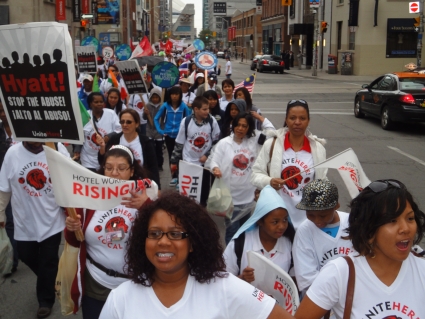Hotel Workers across North America protest corporate attack
Hotel Workers across North America protest corporate attack

In the days leading up to Labour Day, UNITE-HERE workers at Hyatt hotels in Toronto, Chicago, Los Angeles and Honolulu organized one day strikes to protest against the attacks that Hyatt has been carrying out against their workforce as of late, including their attempts to lock-in recession-related cutbacks to workers’ pay in collective agreement negotiations even though company profits have been improving in the past year. In addition to these recent one-day strikes, Hyatt workers in cities across North America, including Boston, Vancouver, Sacramento, Indianapolis, San Francisco, Burlingame, and Santa Clara have organized protests against the hotel’s practices, with some of these protests including non-unionized workers. There was also a similar mobilization of Hyatt workers in the US and Canada that occurred back in July.
In Toronto, attention has recently been drawn to the struggle of hotel workers organized with UNITE-HERE Local 75 for better pay, more regular or set hours and improved staffing through a series of one day strikes and protests that UNITE-HERE has organized at downtown hotels servicing actors and other movie industry players during the Toronto International Film Festival (TIFF) which ran from September 9-19, 2010. During TIFF, UNITE-HERE has organized single day strikes at the Holiday Inn on Bloor Street, Fairmont Royal York and the Hyatt Regency, as well as the Delta East hotel in Scarborough, which isn’t servicing TIFF.
Martin Sheen walked the picket line in support of the UNITE-HERE workers at the Fairmont Royal York strike on September 10th, wearing a UNITE-HERE placard. He said in an interview with theStar that he’s been involved in labour struggles his entire adult life, being a member of the Screen Actors’ Guild, and supports the struggle of the hotel workers because of this. Sheen even said that he had been talking to other celebrities in the hotel about organizing a potential boycott, saying that “there’s enough to make a difference and they are in full support”, though the union responded that this won’t be necessary after thanking him for the gesture of solidarity.
While the support of Sheen and other individual Hollywood stars for the hotel workers during TIFF has been very important in garnering attention for their struggle in the mainstream media and among the broader working class, more impressive from an organizational standpoint is the support they have been offered by the Alliance of Canadian Cinema, Television and Radio Artists (ACTRA), the Toronto president of which, Heather Allin, stated that “the film industry relies on the hotel sector, and we’re not going to stand by and let these hotel workers be exploited.” In an official press release from UNITE-HERE, Allin also stated that “If Toronto's hotel workers cannot resolve relations with Hyatt to ensure workers are treated with respect, then my union will support Hyatt workers in this city and across the continent. They deserve to make a decent living from the work they do. Hyatt will face a determined boycott if they aren't fair to the hard working people who make their hotels possible.” This is the kind of inter-union solidarity necessary in the current period, when the capitalists are trying to recover any profits they lost during their crisis by making cuts to the wages, benefits and working conditions of the working class, as well as the social wage that comes in the form of public services and the social safety net.
UNITE-HERE workers at Royal York have been working without a collective agreement since July 16, 2010, while the UNITE-HERE workers at the Hilton in Etobicoke have been without a contract since January 21, 2010. Of the 40 hotels that UNITE-HERE Local 75 has organized, 13 are owned by Westmont, with approximately 2000 UNITE-HERE workers currently fighting for co-ordinated bargaining across 9 of these 13 hotels, at most of which workers have been without a contract since February of 2010. The workers at eight of these hotels went on one-day strikes during TIFF, and plan to continue with protests and other actions directed against the company.
On the picket line outside the Hilton at Airport Road and Highway 427 there was a definite militant atmosphere, with many workers being very committed to the struggle and the tone of the chants on the line being very spirited. Carlos, a bargaining team member and Hilton worker, said: “I’ve been working here for 25 years, through two recessions, and there’s never been cuts to hours and staffing like this.” He explained how employee hours have been cut significantly in recent years, with employees having to work shifts of just 4 hours, making it difficult for workers with families to afford the commute to work due to both the cost of commuting in the Greater Toronto Area and the cost of daycare. He says they are “fighting to get 8 hours a day.” They are also fighting for the company’s pension contributions to be increased from 55 cents an hour to at least 70 or 75 cents, and to get back the tips that used to be given to valets, which the company took away by charging $25 for a valet service that used to be free. In addition, Carlos noted the rising risk of workplace injury due to the company’s cuts in staffing. He believes this is especially dangerous for kitchen staff, who are at greater risk because of the materials they work with on a daily basis and the incredibly quick pace that is demanded of them.
The struggle of hotel sector workers in Toronto and across North America is an extremely important one for the labour movement as a whole, as this is currently one of the most militant, largest and well-organized workers’ struggles happening in the United States and Canada, and is especially important in major cities, where tourism and the hotel sector make up a large segment of the local economy and where immigrants are particularly exploited in these industries.

